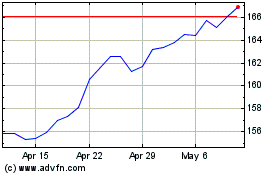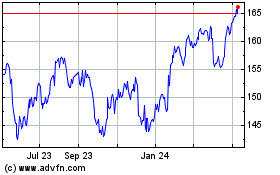Maryland Stands Down in 400-Year-Old Fight With West Virginia Over Potomac Water
November 30 2016 - 6:31PM
Dow Jones News
By Sharon Terlep
Maryland has agreed to give neighboring West Virginia unchecked
access to water from the Potomac River, ending a flare up that
briefly entangled consumer products giant Procter & Gamble
Co.
West Virginia Attorney General Patrick Morrisey had threatened
to sue Maryland if the state refused to give it full rights to draw
from the river, a portion of which defines the border between the
two states. Mr. Morrisey argued that his state needs the water to
support a $500 million manufacturing plant that P&G plans to
build on its side of the Potomac.
In a response to Mr. Morrisey dated Nov. 22, Maryland Attorney
General Brian Frosh and Maryland Secretary of the Environment Ben
Grumbles said the state would "cease reviewing and issuing water
appropriation and use permits for West Virginia users on the
Potomac."
They said Maryland had issued permits only to entities that
requested it do so, and that West Virginia lacks a program to
regulate withdrawals from the river. West Virginia "has
traditionally not taken an active role in the management of this
critical public resource," they wrote.
The Maryland Department of the Environment "has made it clear to
West Virginia users that they are not required to come to Maryland
for permits," a spokeswoman for Mr. Frosh said in a statement. She
declined to say whether Maryland would take action should West
Virginia fail to implement protections, calling the matter
"speculative."
Mr. Morrisey, in a statement Wednesday, said he no longer plans
to sue Maryland and praised the state's "unequivocal acknowledgment
of West Virginia's right to the river."
"It has always been our goal to ensure that there is an adequate
amount of water available for our citizens, while at the same time
protecting and conserving this valuable resource for future
generations," he said.
Mr. Morrisey had argued that Maryland's control over the Potomac
River water is limited by an 1785 compact negotiated by George
Washington, four years before he became the first U.S. president,
as well as a 2003 U.S. Supreme Court decision. Disputes over the
river date back to the 1600s when Virginia and Maryland were both
British colonies and West Virginia wasn't yet its own
territory.
P&G declined to comment.
P&G said the water dispute between the states didn't impact
its new factory because it had received reassurances from officials
in the county where its plant will be located that there was
adequate water for the plant that will make Pantene shampoos and
Old Spice body wash.
Write to Sharon Terlep at sharon.terlep@wsj.com
(END) Dow Jones Newswires
November 30, 2016 18:16 ET (23:16 GMT)
Copyright (c) 2016 Dow Jones & Company, Inc.
Procter and Gamble (NYSE:PG)
Historical Stock Chart
From Mar 2024 to Apr 2024

Procter and Gamble (NYSE:PG)
Historical Stock Chart
From Apr 2023 to Apr 2024
